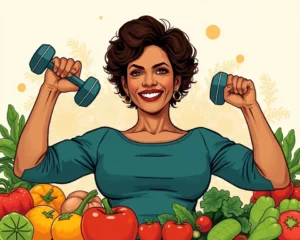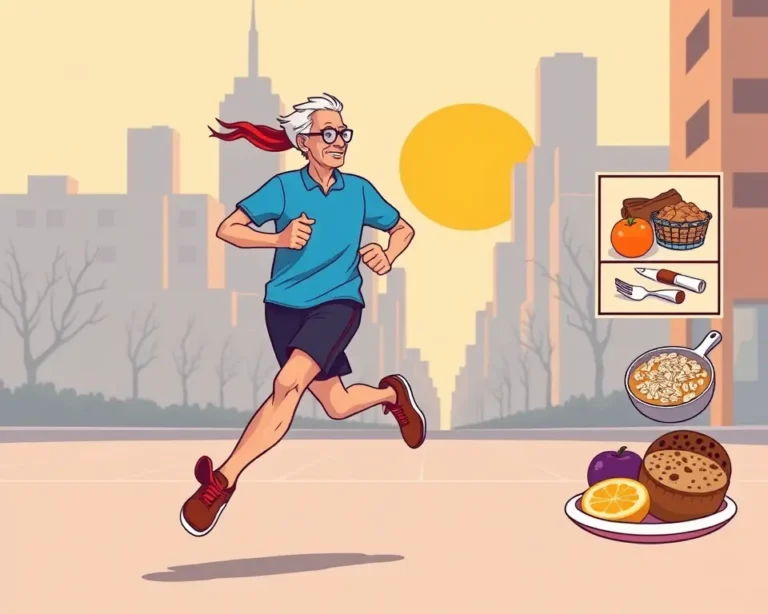An increasing number of octogenarians are defying age and crushing finish lines. What is their secret? For many, like 80-year-old marathon runners, the answer lies in a combination of dedicated training, a positive mindset, and, crucially, a strategic approach to nutrition, especially breakfast. Here we uncover the secrets of how dedicated senior runners fuel their bodies to continue competing at a high level.
The Importance of Breakfast for Senior Marathon Runners
Breakfast is especially vital for runners, and even more so for older adults, as it replenishes energy stores used overnight and sets the stage for a day of training and recovery. Given the physiological changes that come with aging, such as decreased muscle mass and bone density, the nutritional needs of senior runners require careful attention. What an 80-year-old eats can make all the difference in their performance and overall well-being.
Fueling the Engine: Carbohydrates for Sustained Energy
Carbohydrates are the primary fuel source for runners, providing the energy needed to power through long distances. For senior marathoners, choosing the right type of carbohydrates is essential.
- Complex Carbohydrates: Oatmeal, whole-grain toast, bagels, and cereals provide a sustained release of energy, preventing energy crashes during long runs.
- Simple Carbohydrates: Fruits like bananas and berries offer a quick energy boost and are easy to digest before a run.
Consuming 50-125g of carbohydrates 1-4 hours before a long run is often recommended, but individual tolerance should guide the timing.
Protecting Muscle Mass: The Role of Protein
As we age, we naturally lose muscle mass, a process called sarcopenia. Protein becomes increasingly important to combat this decline and support muscle repair and recovery.
- Protein Sources: Eggs, yogurt, nuts, seeds, and lean meats are excellent sources of protein that can be incorporated into a runner’s breakfast.
- Timing: Spreading protein intake throughout the day is crucial, as the body can only absorb a limited amount at one time. Aiming for at least 1.2 grams of protein per kilogram of body weight daily can help older runners maintain muscle mass.
Bone Health: Calcium and Vitamin D
Maintaining strong bones is vital for runners of all ages, but especially for older adults who are at higher risk of osteoporosis.
- Calcium-Rich Foods: Dairy products (milk, yogurt, cheese), fortified plant-based milks, dark leafy greens, and fish are good sources of calcium. Women should aim for 1,200 mg daily, while men should target 1,000 mg.
- Vitamin D: Essential for calcium absorption, Vitamin D can be obtained through sunlight, fortified foods, and supplements.
Hydration: The Often-Overlooked Essential
Dehydration can significantly impact performance and increase the risk of injury. Senior runners must prioritize hydration, especially before, during, and after runs.
- Water: The primary source of hydration.
- Electrolyte Drinks: Can help replace lost electrolytes, especially during long runs or in hot weather.
Anti-Inflammatory Foods for Joint Health
Chronic inflammation can hinder recovery and increase the risk of injuries. Incorporating anti-inflammatory foods into the diet can help older runners maintain joint health.
- Fruits and Vegetables: Rich in antioxidants, which combat inflammation.
- Omega-3 Fatty Acids: Found in flaxseeds, chia seeds, hemp seeds, nuts, olive oil, and fatty fish, these healthy fats help reduce inflammation.
- Spices: Turmeric and ginger have potent anti-inflammatory properties and can be added to teas, smoothies, or meals.
Sample Breakfast Ideas for the Mature Marathoner
Here are some breakfast examples that incorporate the principles discussed above:
Oatmeal with Berries, Nuts, and Seeds: Provides complex carbohydrates, antioxidants, healthy fats, and fiber. Add a scoop of protein powder for an extra boost.
Yogurt with Granola and Fruit: Offers a good balance of carbohydrates, protein, and calcium. Choose Greek yogurt for a higher protein content.
Whole-Grain Toast with Avocado and Egg: Provides healthy fats, protein, and complex carbohydrates.
Smoothie with Fruit, Spinach, and Protein Powder: A quick and easy way to pack in nutrients. Add a source of healthy fats like avocado or nut butter.
Bagel with Peanut Butter and Banana: A classic runner’s breakfast that’s easy to digest and provides a good source of carbohydrates and healthy fats.
Mary Palmer’s Breakfast Strategy
Mary Palmer, an 80-year-old marathon runner, starts her day with chamomile tea, ginger, turmeric, lemon juice, and honey, highlighting the importance of anti-inflammatory ingredients and vitamin C.
Additional Nutritional Considerations for Senior Runners
- Listen to Your Body: Pay attention to how different foods affect your performance and adjust your diet accordingly.
- Consider Supplements: Talk to your doctor or a registered dietitian about whether supplements like Vitamin D, calcium, or protein powder are right for you.
- Maintain a Healthy Weight: Maintaining a healthy weight can reduce stress on joints and improve overall performance.
- Consult a Professional: A registered dietitian can provide personalized nutrition advice based on your individual needs and goals.
Exercise as an Essential Part of the Equation
While diet plays a crucial role, exercise remains paramount. Mary Palmer begins her training at 6:30 am, running 10 laps of a 1km circuit and climbing stairs before breakfast, showing that a balance of diet and exercise are necessary.
Mindset: The Unsung Hero
Connie Brown, a New York City marathon icon who ran her 44th consecutive race on her 80th birthday, exemplifies the importance of a positive mindset. Her passion for endurance sports and unwavering dedication to training are truly inspiring.
Conclusion: Run Strong, Live Long
Running marathons at 80 is an extraordinary achievement that requires a holistic approach to health and fitness. By prioritizing a balanced diet rich in carbohydrates, protein, and anti-inflammatory foods, staying hydrated, and maintaining a positive mindset, senior runners can continue to defy age and enjoy the many benefits of this challenging and rewarding sport. With the right strategies, you can keep running strong and living long.







